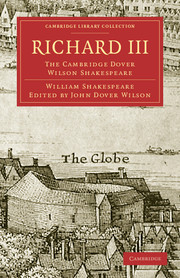INTRODUCTION
Published online by Cambridge University Press: 07 September 2010
Summary
TEXT AND DATE
For a present-day editor the outstanding problem of Richard III is its text, the origins and nature of which were first satisfactorily explained, and the superiority of the folio to the quarto version finally vindicated, in a book published by Professor Patrick of Arizona as recently as 1936. Since then only one edition as far as I know has appeared, Professor Peter Alexander's in The Tudor Shakespeare, 1951; and the fact that his text differs from Aldis Wright's in the classical Cambridge Shakespeare in well over a thousand readings reveals at once the corrupt state of most current texts and the magnitude of the issues involved. For a discussion of these issues the reader is referred to Sir Walter Greg's Editorial Problem in Shakespeare, 1942 (2nd ed. 1951), or to the Note on the Copy below. Considering it was but a single item in a thorough-going recension of the whole canon, Alexander's Richard III is an astonishing tour de force; and the present edition is deeply indebted to it. First drafting my own text in the light of Patrick's theory and Greg's comment upon it, I was reassured to find on turning to Alexander's that our differences as regards readings, where the choice lay between the folio and the quarto, were remarkably few. In some of these he won me over; in others, as my notes record, he did not.
- Type
- Chapter
- Information
- Richard IIIThe Cambridge Dover Wilson Shakespeare, pp. vii - xlvPublisher: Cambridge University PressPrint publication year: 2009First published in: 1954

